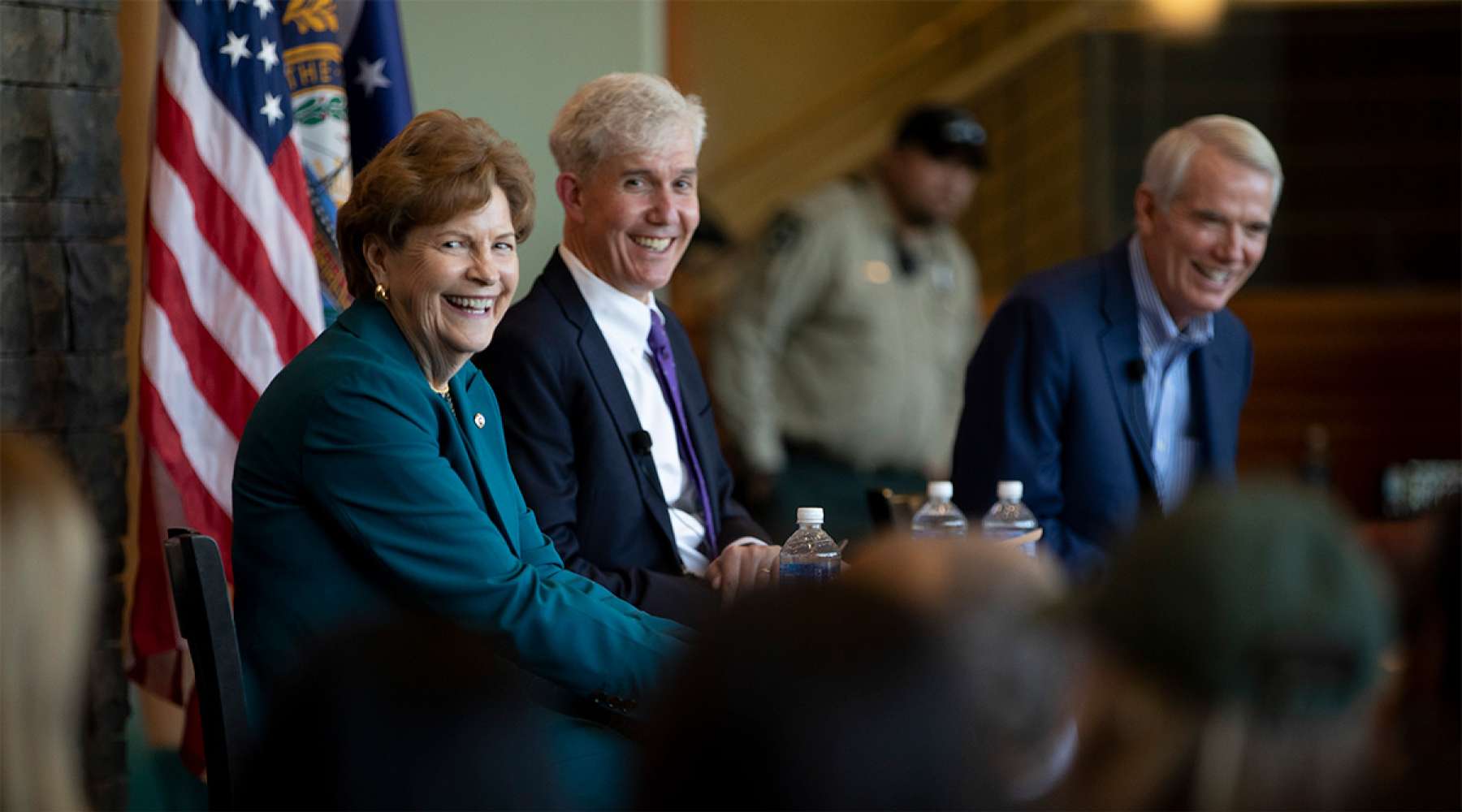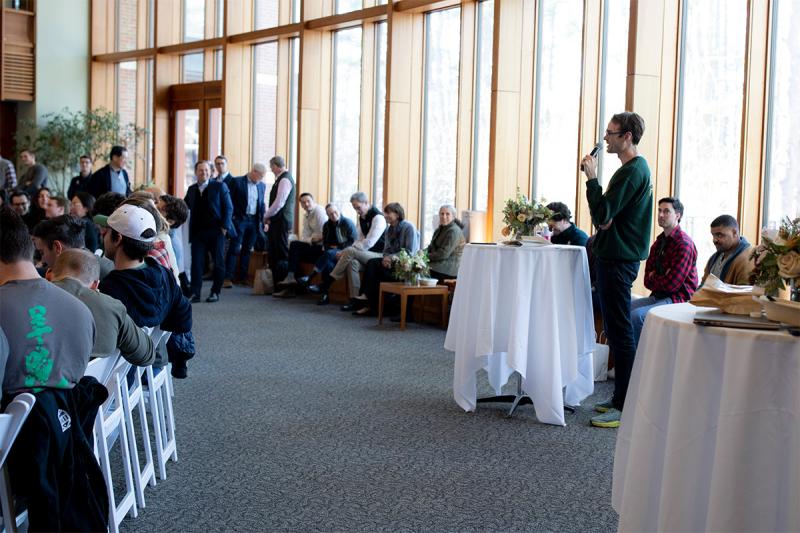
Pictured above: Former U.S. Senator Rob Portman D’78 (R-OH) and Senator Jeanne Shaheen (D-NH) alongside Dean Matthew J. Slaughter for a conversation with the Tuck community about the outcomes of the 2024 presidential election and their implications for policy and politics. | Photo by Laura DeCapua
On Friday, November 15, Tuck welcomed Former U.S. Senator Rob Portman D’78 (R-OH) and Senator Jeanne Shaheen (D-NH) for a discussion on the 2024 presidential election and its broader political and policy implications. Katie Berdy T’25, a fellow with the Center for Business, Government & Society, shares insights from the forum, her role in organizing it, and why the intersection of business and government is important.
You recently helped organize a fireside chat with Former U.S. Senator Rob Portman D’78 (R-OH) and Senator Jeanne Shaheen (D-NH). Tell us more about why you wanted to organize this event at Tuck.
Given this was an election year, I thought it would be meaningful to invite elected officials to campus. Specifically, I wanted to invite leaders who would offer a relatable and accessible perspective as Senator Shaheen and Senator Portman do with their respective connections to New Hampshire and Dartmouth. I wanted the fireside chat to demystify the stereotype of career politicians. We’ve hosted and heard from so many inspiring business leaders at Tuck that I thought having leaders from the government would be a valuable complement. I hoped the event would inspire students to take a more active role in understanding and shaping the political landscape, regardless of their career paths.
In listening to Senators Portman and Shaheen, what were your biggest takeaways?
One of my biggest takeaways from the forum was the need to regulate money in politics. Senator Shaheen highlighted the record-breaking sums poured into the 2024 New Hampshire Governor’s race, while Senator Portman discussed fundraising challenges in the internet era, where voters are drawn to catchy, quippy emails rather than substantive messages outlining a candidate’s policies. This left me thinking about how we can and should create more guardrails to focus campaigns and elections on the issues—not the money.
Senators Shaheen and Portman both pleasantly surprised me with their stories about working together in the Senate and the amount of bipartisan work they’ve done. I left the conversation wishing we had more elected officials who could put the letter next to their name aside and reach across the aisle to pass landmark legislation like the Bipartisan Infrastructure Law.
Lastly, and perhaps the most salient comments from both Senators were their calls for more young people to pursue careers in politics at any level. I think many Americans only think about politics at the national level, but leadership at the state and local levels is so important. I hope my Tuck classmates will think about how they can use their wise and decisive leadership skills to better the communities in which they work and live.

Members of the Tuck community gather in the McLaughlin Atrium to gain senatorial perspectives and engage in a Q&A session with Portman and Shaheen. | Photo by Laura DeCapua
In your opinion, why is the intersection of business and government important?
The intersection of business and government is essential to foster collaboration in problem-solving, drive sustainable economic development, and create policies that have a meaningful impact. Businesses provide jobs, innovation, and wealth generation that is made possible by infrastructure and education funded by governments.
I believe businesses play an increasingly important role in addressing some of the toughest problems, like climate change, because of their ability to innovate and their access to capital. The government plays an important role in providing financial incentives and grant opportunities to fund these innovations. Businesses can amplify government investments in renewable energy, health care, and technology to increase the societal benefit. In my opinion, business and government leaders can’t afford to work in silos—together they can tackle challenges that neither sector could solve alone.
You are a fellow with the Center for Business, Government & Society. Tell us a little more about this role and how your involvement with the center relates to your career interests and passions.
Before Tuck I worked in public sector consulting at Accenture and did a year-long policy fellowship with Connecticut Governor Ned Lamont, focusing on Medicaid policy. From these experiences, I witnessed the transformative power of private sector tools and resources to address complex problems in government. I came to Tuck to position myself as a leader across sectors, and the Center for Business, Government & Society provides a unique opportunity to explore this interest.
In the fall, my main involvement with the Center was through election-related programming and organizing events like the Senators' fireside chat. As someone passionate about civic engagement, it was incredibly rewarding to increase election education across Tuck and invite elected officials on campus with the support of the Center.
Looking ahead to the Spring, I am excited about facilitating programming around the role of public-private partnerships as this is an area I’d like to explore professionally. With the Center’s support and Tuck’s incredible alumni network, I hope to organize events that will not only deepen my understanding but also educate the broader Tuck community on the impact and potential of successful collaborations across sectors.

Senator Shaheen and Dean Slaughter share a lighthearted exchange to conclude Tuck’s Fireside Forum. | Photo by Laura DeCapua

Katie Berdy is a second-year Tuck student. She intends to pursue a career path where she can apply her MBA skillset to address problems in government and/or healthcare. Katie loves spending time outside—cycling, hiking, skiing, and running are some of her favorite things to do in the Upper Valley.
The Center for Business, Government & Society (CBGS) creates and develops awareness, knowledge, skills, wisdom, and leadership on issues at the intersection of business, government, and society. Focus areas are inherently dynamic, responsive to the challenges and opportunities leaders are facing. Since inception, these have included ethics, sustainability, social entrepreneurship, impact investing, corporate responsibility, public-private-social sector partnerships, community engagement, and public and social sector leadership.